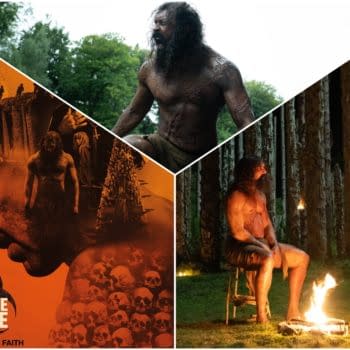Posted in: Movies | Tagged: entertainment, film, indy filmmaking
Film Schooling: Insider Insights Into Indy Filmmaking – Post Production And Momentum
By Chris Hood
(This is Part Nineteen of an ongoing series to help educate aspiring filmmakers on the process of making their first film. Previous articles in this series can be found at BleedingCool.com and MovieIndustry.com)
Parts: 1, 2, 3, 4, 5, 6, 7, 8, 9, 10, 11, 12, 13, 14, 15, 16, 17, 18
Congratulations on finishing principle photography of your film. It's quite an accomplishment, but the bigger one will prove to be navigating the minefield of post production and actually completing the film and getting distribution. If you knew the likelihood of making these two things happen, you'd probably throw in the towel right now and cut your losses, but I'm assume you're blissfully ignorant and still think your little opus is not only going be amazing, but that you'll actually see it turn a profit. We'll deal with your delusions and the shady business of distribution in a later article. For the moment, we'll focus on simply getting your film complete. Easier said than done. You need to keep that momentum going that you picked up during principle photography. And that is a tough, tough chore.
Let's face it, shit was happening all day, every day while you were shooting. You may not have gotten everything you wanted at every shoot. You may have had to cut some scenes and deal with some disappointments. You've certainly made more than a few compromises, but you felt progress being made every day. It was tangible. You could watch the dailies and know you had another 3% or 4% or 5% of the movie in the can. That feels good. Every day there were appreciable steps toward the finish line. And now you need to be prepared for that excitement to grind to a practical halt.
I learned something very early in life that applies to virtually every business decision you'll ever make. You can have it fast, good and cheap…but you can only have two. Take a moment to reflect on that. I've come back to this time and again in my life and it seems to hold true in every case. It applies to building a house, hiring a lawyer, contracting an artist and it certainly applies to making a movie.
The thing is, if you're reading these articles, you're working on a limited budget. So that means you have to live without either the "fast" or the "good." You can only have one. Since this is an empirical truth of filmmaking, make your decision now. Though most filmmakers will deny this Rule of Three applies to them, rest assured, it does. They may refuse to make the decision when first confronted but upon reflection, they will almost always concede they sacrificed time over quality – which is the right decision, by the way.
Most indy films, especially those under a million dollars, take a very long time to post. A year in post production on a small film is an accomplishment. I realize it sounds like forever. I know it did to me, but my first film lagged in post for over two years. And that's actually not bad. Stories of 5, 7 or even 10 years finishing a small film are common. Yes, they are common. People run out of money. People lose interest. People flake out. People miss deadlines. People disappoint.
Your post production team is likely a very small group of people with good intentions. I only hope they have the talent and commitment necessary for the undertaking. They rarely do. Usually on projects like these, you have a post team that is "doing you a favor," or at least that's how they feel about it.
You've negotiated with your editor for the best possible deal. He might want $150 an hour and you've convinced him you're a starving filmmaker and to take $75 an hour. Maybe you even talked him into doing the whole job for $10k. Either way, you're not paying him his regular rate. Translation – he's doing you a favor. Here's the problem – when other jobs present themselves at full rate, he's probably going to take them. I at least hope this has been discussed prior to the job starting (if not, you should certainly bring it up and make sure it's addressed in the contract). That's something a professional will do. "I can do that for you, but I have to work around my other gigs," is very common. If you can avoid putting yourself and your project in this scenario, do it. But that's tough. You want it good and cheap, so it's not going to be fast.
So your 10 weeks to a rough cut can end up being 20 or 30 weeks, generally even if your guy is working on it "full time." Seriously, it will take longer than you expect. Then, the reality is, you'll almost certainly need some pick-ups. Once you see the film in a rough assembly, there will be fixes needed and they almost always require a bit more shooting. Unfortunately, that doesn't mean you lose three more days to shoot. It means, you have to put all that together. It means figuring out exactly what you need from this "last" get together and planning and coordinating it all again just like the first time around. It means securing locations and it means getting equipment booked. It means working around availability of talent, which, it seems, aren't nearly as excited about pick-ups as they were about the original shoot. Be prepared for some posturing here.
I had an actor on "Dirty Dealing 3D," which proved to be terribly difficult on pick-ups. Although he and I talked directly to get him on the show, it seems a couple lines on a couple of TV shows since wrapping my film had inflated his head to Bieber-like levels. He couldn't be bothered with me, so I had to deal with his agent. That meant every time I presented a day for him to work, I had to get it to her, she would eventually get in touch with him, he would get back to her and finally I'd hear from her that – he wasn't available that day. After a couple of misses and very little help or offered alternatives, I started offering a few days. No luck. So I finally had to offer a few weeks out of which I needed a single day. I would have to work the entire schedule around this guy because wanted to take a trip home for a few weeks and didn't want to have to reschedule it. "Prima donna" comes to mind…
When he finally conceded to a day he was willing to bless us with his presence, then the additional demands came in. He wanted more money. Yes, for his one day, he wanted more than was his daily rate. It didn't matter to him that pick-ups were clearly laid out in his contract as well as that they were to be at the same rate as the original shoot, but his word didn't seem to mean much and he demanded more. On top of that, petty as this sounds, I had to pay a friend of his money for "gas and time" so he could be driven to the airport. As was the case with the actress I spoke of earlier who breached her contract, he knew he was indispensable and pulled a power play. The thing that amazes me is how stupid and short-sighted people can be. Prior to all this, I had liked the guy. I was very happy with his work on the film and would have hired him again. I loved getting a call from a director about him a month or so later asking what it was like working with him. This business is small. If you're an asshole the word will get around. Both this actor and the actress who made things unnecessarily difficult for me got it back in spades.
So our pick-ups ending up being more than five weeks from when we started planning them. Of course, there could have been other issues with other actors and/or crew who may have had overlapping schedules or other conflicts. It can take several months to get your pick-ups. And then it's back to the editing room. And by that I mean it's back the editing room if your editor isn't too busy with a better job that pays him more.
An awful lot of first time filmmakers I speak to say they'll have picture lock in 3 months. Never. Happens. Six months would be awesome. A year isn't bad. I'd say shoot for a year.
And then it's time to get to sound. And guess what? You get to start this whole game all over again. You'll make a deal with a good sound mixer who will be doing you a favor by taking on your project at far less than his asking price…but you have to understand that as other jobs come in…well, you know. And when you find a composer you want to use – same deal. Of course, if you have other post elements like fancy opening credits sequences and cool CG shots, tack on a chunk more time for that, but stay on these people. Remember, they work for you.
The fix for this, generally speaking, is to allocate enough money to pay these people solid rates. Great. Awesome. Go back to your rich uncle and get some more money if you can. Most of us don't have that option. Even if you allow generously for post in your original budget, there are almost always overages before you get to that point and money is "borrowed" from what was supposed to be set aside for post. If you can get more, great. If you can't, the clock will slow. You'll think you can actually count the sands dropping through the hourglass.
So how do you keep the momentum? Well, that's the real trick. It's hard to crack the whip when people are doing you favors. The best advice I can give is deadlines…and stick to them. Where this gets complicated is when other factors cloud the situation. You promise the composer picture by January 1 so he can have the score by March 1, yet there are delays and you don't get it to him until February 1. He already booked a job starting March 2, so he can give you a month, but is booked for March and April. He can get back to it May…. In that case, it's not his fault. What do you do? Have hard deadlines and penalties where you can. But when you already have a guy working at 50% his regular rate, he's probably not going to agree to taking another pay cut if he runs a bit over. Good luck. Welcome to the world of low budget producing.
Keep the momentum going. Be on it every day. Be prepared to cut your losses. Make sure you're not beholden to anyone. Contract that you get regular updates and see regular progress. If your editor is falling behind, make sure you have the ability to pull the plug and go elsewhere without losing all the work that's already been done. It's a terrible thing to have to do and you lose time and money, but if the alternative is waiting another year, there are times you have to make the tough decisions.
The goal should be that something is happening every day of post; at least every business day. It's not going to happen, but keep the pressure on. Your ability to choose the best people and handle them most effectively will play a major part in your post success. I can't teach you how to do either of these, so I hope you have that inherent ability because if you don't, you might just have make sure your premiere has plenty of handicapped seating for your now-geriatric cast to join you for "that little movie we shot all those years ago!"
Chris Hood is a writer, producer and director of such films as "Counterpunch" starring Danny Trejo (a Lionsgate release) and "Dirty Dealing 3D" with Michael Madsen and C. Thomas Howell. He and Jon Schultz own Robin Hood Films, a Las Vegas-based distribution company representing English language films around the world and operates a film blog at MovieIndustry.com. He's also dead sexy. (Mr. Hood denies any involvement in the creation of this mini-bio.)
















